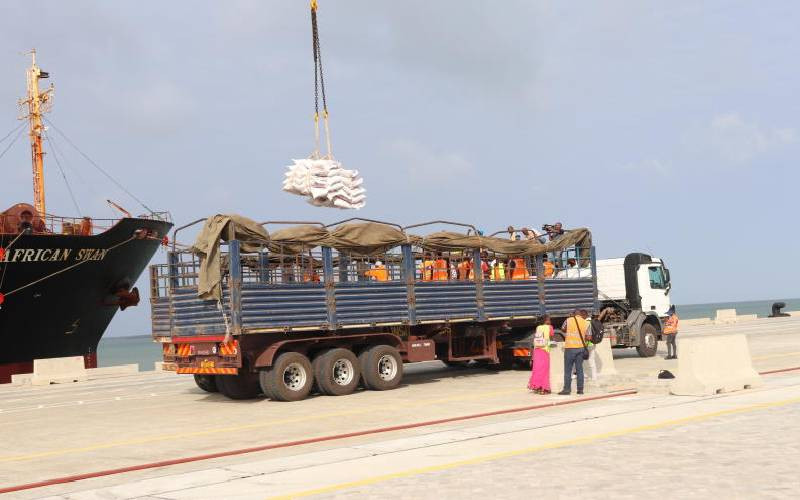Yemen ceasefire efforts gathered pace Sunday after more than six weeks of Saudi-led air strikes, with rebels saying they would respond "positively" and their allies accepting a US-backed truce plan.
The renegade troops, who helped the Shiite Huthi rebels seize much of the country, said they had agreed to the five-day humanitarian truce that Riyadh has offered from Tuesday.
The rebels did not refer explicitly to the Saudi offer, but expressed "readiness to deal positively with any efforts, calls or measures that would help end the suffering".
Amid the truce moves, a ship chartered by the UN's World Food Programme docked in the western port of Hodeida, bringing fuel to boost aid deliveries.
It aimed at "opening up a new humanitarian lifeline for civilians impacted by the conflict" in Yemen, where drastic fuel shortages have hurt aid operations, the WFP said.
The MV Amsterdam brought 300,000 litres of fuel and supplies for humanitarian organisations, while a second vessel would bring another 120,000 litres later Sunday.
WFP Yemen director Purnima Kashyap said the fuel will mean aid can reach "hundreds of thousands of people in need of urgent food assistance".
The United Nations has expressed deep concern about the civilian death toll from the bombing campaign and the humanitarian impact of the air and sea blockade that Saudi Arabia and its allies have imposed on Yemen.
Coalition warplanes pounded the Huthi stronghold Saada in the northern mountains for a second straight night Saturday after declaring the whole province a military target.
'Civilians trapped'
Aid agencies said 70,000 people, including 28,000 children were fleeing Saada, calling for an immediate ceasefire in a statement signed by 17 organisations including Oxfam.
"There is an urgent need to halt hostilities in order to move humanitarian aid to the country," said Daw Mohamed, country director of CARE International in Yemen.
The UN's humanitarian coordinator for Yemen, Johannes van der Klaauw, has warned that civilians were trapped in Saada and warned of "the indiscriminate bombing of populated areas".
Warplanes also launched twin strikes on the Sanaa residence of ousted president Ali Abdullah Saleh, who is accused of orchestrating the alliance between renegade army units and the rebels.
These troops, who remained loyal to Saleh after he was forced from power in early 2012, played a major part in the Iran-backed rebels' capture of swathes of the country beyond Saada.
Stay informed. Subscribe to our newsletter
"Following mediation from friendly countries to establish a humanitarian truce... we announce our agreement," said Colonel Sharaf Luqman, spokesman for the army defectors.
The defectors' bases have been a major target in the coalition campaign in support of exiled President Abedrabbo Mansour Hadi.
The United Nations says the conflict has killed more than 1,400 people since late March.
The rebels welcomed efforts by "friendly countries to end the aggression and the suffering of the Yemeni people" -- an apparent reference to Russia which has pressed for a halt to the air war.
Conditional ceasefire
Saudi Arabia said its ceasefire offer is conditional on the rebels reciprocating and not exploiting it for military advantage.
Saleh's political party, the General People's Congress said it hoped the proposal would minimise the "impact of the aggression that has burdened the Yemeni people with unprecedented suffering and an unparallelled blockade".
Riyadh said the rebels had crossed a "red line" with deadly shelling of populated border areas of the kingdom last week.
Coalition spokesman Brigadier General Ahmed al-Assiri told AFP that Saudi artillery pounded positions inside Yemen after renewed rocket fire wounded four women in the kingdom on Sunday.
Clashes also raged between rebel and pro-Hadi forces in the main southern city of Aden, killing civilians and fighters, including prominent Hadi loyalist Haitham al-Adani, medics and military sources said.
A new alliance of local associations, businessmen and activists in Aden, meanwhile, issued a statement appealing for international humanitarian aid.
The Aden Alliance for Popular Aid said the city urgently needed food supplies, medicines, field hospitals and fuel, as well as "safe corridors" within areas of fighting so the wounded can be evacuated.
Planes of coalition partner United Arab Emirates, meanwhile, airdropped 55 tonnes of humanitarian aid in Aden, state news agency WAM reported.
In Shabwa province further east, an apparent US drone strike killed four Al-Qaeda suspects, a military official said.
 The Standard Group Plc is a
multi-media organization with investments in media platforms spanning newspaper
print operations, television, radio broadcasting, digital and online services. The
Standard Group is recognized as a leading multi-media house in Kenya with a key
influence in matters of national and international interest.
The Standard Group Plc is a
multi-media organization with investments in media platforms spanning newspaper
print operations, television, radio broadcasting, digital and online services. The
Standard Group is recognized as a leading multi-media house in Kenya with a key
influence in matters of national and international interest.
 The Standard Group Plc is a
multi-media organization with investments in media platforms spanning newspaper
print operations, television, radio broadcasting, digital and online services. The
Standard Group is recognized as a leading multi-media house in Kenya with a key
influence in matters of national and international interest.
The Standard Group Plc is a
multi-media organization with investments in media platforms spanning newspaper
print operations, television, radio broadcasting, digital and online services. The
Standard Group is recognized as a leading multi-media house in Kenya with a key
influence in matters of national and international interest.







